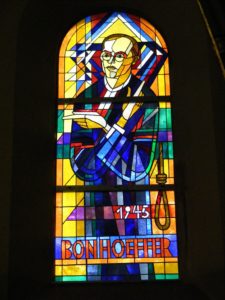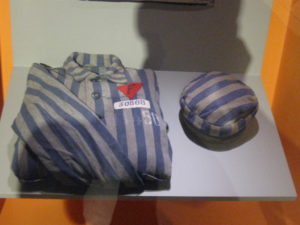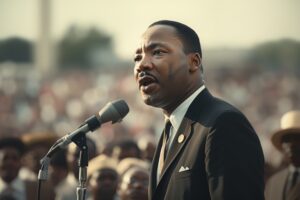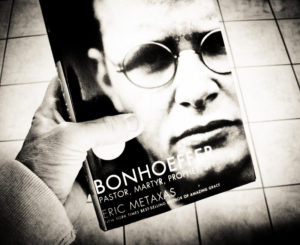Posted by Roberta Grimes • November 30, 2024 • 2 Comments
Human Nature
Hello darkness, my old friend.
I’ve come to talk with you again.
Because a vision, softly creeping,
Left its seeds while I was sleeping,
And the vision that was planted in my brain still remains
Within the sound of silence.
In restless dreams, I walked alone,
Narrow streets of cobblestone,
‘Neath the halo of a street lamp
I turned my collar to the cold and damp
When my eyes were stabbed by the flash of a neon light
That split the night and touched the sound of silence.
And in the naked light, I saw
Ten thousand people, maybe more.
People talking without speaking.
People hearing without listening.
People writing songs that voices never shared,
And no one dared disturb the sound of silence.
– Paul Simon, from “The Sound of Silence” (1964)
 I was born into a Protestant family not long after the Second World War, so a name that most people living now likely never have heard before this weekend was a familiar and grounding fact of my childhood. Because of my childhood experience of light, I went to grownup church and not Sunday School from April of the year when I turned nine, so I heard him referred to often in sermons. My parents would mention him at home. Dr. Dietrich Bonhoeffer was a young German Lutheran minister during the Second World War. He was a European version of Dr. Martin Luther King, Jr., in that he was a clergyman who fought governmental injustice that was being inflicted upon the Jews, who were then a famously persecuted European minority. And like Dr. King, Dr. Bonhoeffer was martyred when he was only thirty-nine. If he had been a Catholic priest, he would already long since have been declared a saint. But as it is, it has taken until this Thanksgiving weekend in the United States for Dr. Dietrich Bonhoeffer’s life to make it to the silver screen.
I was born into a Protestant family not long after the Second World War, so a name that most people living now likely never have heard before this weekend was a familiar and grounding fact of my childhood. Because of my childhood experience of light, I went to grownup church and not Sunday School from April of the year when I turned nine, so I heard him referred to often in sermons. My parents would mention him at home. Dr. Dietrich Bonhoeffer was a young German Lutheran minister during the Second World War. He was a European version of Dr. Martin Luther King, Jr., in that he was a clergyman who fought governmental injustice that was being inflicted upon the Jews, who were then a famously persecuted European minority. And like Dr. King, Dr. Bonhoeffer was martyred when he was only thirty-nine. If he had been a Catholic priest, he would already long since have been declared a saint. But as it is, it has taken until this Thanksgiving weekend in the United States for Dr. Dietrich Bonhoeffer’s life to make it to the silver screen.
 For each of us, current history happens from our own eccentric perspective. And for me as a child, Dietrich Bonhoeffer became the human face of the Second World War. As I was growing up, I saw him loom as a great hero-minister who had saved many people that Adolf Hitler was trying to kill. So, Dr. Bonhoeffer had nobly tried to kill Hitler, but the Germans had caught him and had killed him instead. Or it had happened more or less that way. His name is musical, which made it memorable, and since I majored in Christian history in college, and Dr. Bonhoeffer was still very much in my mind, I studied some of his writings in college. As someone so young, so naive and idealistic, I found much of what he had written to be strong, and even wrenchingly acerbic. I was too young then to really understand it, and to see it for what it truly was. His were the triumphal writings of a man who was truly living his Christian faith precisely as Dr. King had done, in the awful time in history into which he had been born.
For each of us, current history happens from our own eccentric perspective. And for me as a child, Dietrich Bonhoeffer became the human face of the Second World War. As I was growing up, I saw him loom as a great hero-minister who had saved many people that Adolf Hitler was trying to kill. So, Dr. Bonhoeffer had nobly tried to kill Hitler, but the Germans had caught him and had killed him instead. Or it had happened more or less that way. His name is musical, which made it memorable, and since I majored in Christian history in college, and Dr. Bonhoeffer was still very much in my mind, I studied some of his writings in college. As someone so young, so naive and idealistic, I found much of what he had written to be strong, and even wrenchingly acerbic. I was too young then to really understand it, and to see it for what it truly was. His were the triumphal writings of a man who was truly living his Christian faith precisely as Dr. King had done, in the awful time in history into which he had been born.
 There was one difference between Dr. Bonhoeffer and Dr. King. Dietrich Bonhoeffer was seen by the German to be a well-bred blond Aryan. To the race-obsessed Nazis, he was just what a model human being ought to be, so even as the war raged on, he could and did come and go freely. He even came to the United States, but he could not bear to be outside Germany and safe when there were so many still there who were not safe. So in the end, he had to go back. He even joined the Nazi party for a time and served as a double-agent. Since he was a sweet-faced, upper-class blond minister, at first there was nothing that he could not do, especially since many German clergymen welcomed the rise of Adolf Hitler. To Dr. Bonhoeffer, though, the antisemitism of Nazism was such anathema that he opposed Hitler almost from the start. He soon therefore also opposed the complacent theological ideas that made supporting Hitler even possible for Christians. He insisted that Christians must stand resolutely righteous in a world gone wrong.
There was one difference between Dr. Bonhoeffer and Dr. King. Dietrich Bonhoeffer was seen by the German to be a well-bred blond Aryan. To the race-obsessed Nazis, he was just what a model human being ought to be, so even as the war raged on, he could and did come and go freely. He even came to the United States, but he could not bear to be outside Germany and safe when there were so many still there who were not safe. So in the end, he had to go back. He even joined the Nazi party for a time and served as a double-agent. Since he was a sweet-faced, upper-class blond minister, at first there was nothing that he could not do, especially since many German clergymen welcomed the rise of Adolf Hitler. To Dr. Bonhoeffer, though, the antisemitism of Nazism was such anathema that he opposed Hitler almost from the start. He soon therefore also opposed the complacent theological ideas that made supporting Hitler even possible for Christians. He insisted that Christians must stand resolutely righteous in a world gone wrong.
 I can give you just a flavor of Dr. Bonhoeffer here. A lot of his most brilliant writing was done from prison and smuggled out in letters that he may not have imagined might ever be published. But like Dr. King, Dietrich Bonhoeffer was a man shaped by his times and by the radical teachings of Jesus into a greatness that transcends time. And now, like Dr. King, Dr. Bonhoeffer is one of the very few who are best fit to teach and to lead us as we seek to ever better serve God in the morally complex world of today. Let’s spend a few moments sitting at his feet as he shares with us the kind of wisdom that can come only from a life deeply grounded in Jesus and lived in radical service to God in the face of unimaginable evil. Remember that these are the thoughts of a very young minister who has been imprisoned by the Nazis for having save many Jews from the death camps. And he is plotting now with those trying to take down Hitler, so he is not sure whether he himself will survive:
I can give you just a flavor of Dr. Bonhoeffer here. A lot of his most brilliant writing was done from prison and smuggled out in letters that he may not have imagined might ever be published. But like Dr. King, Dietrich Bonhoeffer was a man shaped by his times and by the radical teachings of Jesus into a greatness that transcends time. And now, like Dr. King, Dr. Bonhoeffer is one of the very few who are best fit to teach and to lead us as we seek to ever better serve God in the morally complex world of today. Let’s spend a few moments sitting at his feet as he shares with us the kind of wisdom that can come only from a life deeply grounded in Jesus and lived in radical service to God in the face of unimaginable evil. Remember that these are the thoughts of a very young minister who has been imprisoned by the Nazis for having save many Jews from the death camps. And he is plotting now with those trying to take down Hitler, so he is not sure whether he himself will survive:
“We are not to simply bandage the wounds of victims beneath the wheels of injustice, we are to drive a spoke into the wheel itself.”
“Silence in the face of evil is itself evil: God will not hold us guiltless. Not to speak is to speak. Not to act is to act.”
“We live by responding to the word of God… since this word is addressed to our entire life, the response, too, can only be an entire one; it must be given with our entire life as it is realized in all our several actions.”
“How wrong it is to use God as a stop-gap for the incompleteness of our knowledge… We are to find God in what we know, not in what we don’t know.”
“I should like to speak of God not on the boundaries but at the center, not in weaknesses but in strength; and therefore, not in death and guilt but in life and goodness… God is the beyond in the midst of our life. The church stands, not at the boundaries where human powers give out, but in the middle of the village.”
“It was the error of Israel to put the Law in God’s place, to make the law their God and their God a law.”
“God loves human beings. God loves the world. Not an ideal human, but human beings as they are; not an ideal world, but the real world. What we find repulsive in their opposition to God, what we shrink back from with pain and hostility… this is for God the ground of unfathomable love.”
“‘Blessed are they that mourn, for they shall be comforted’… By ‘mourning’ Jesus, of course, means doing without what the world calls peace and prosperity: He means refusing to be in tune with the world or to accommodate oneself to its standards. Such men mourn for the world, for its guilt, its fate, and its fortune.”
Christian love draws no distinction between one enemy and another, except that the more bitter our enemy’s hatred, the greater his need of love. Be his enmity political or religious, he has nothing to expect from a follower of Jesus but unqualified love. In such love there is no inner discord between private person and official capacity. In both we are disciples of Christ, or we are not Christians at all… The disciples realized that they too were his enemies, and that he had overcome them by his love. It is this that opens the disciple’s eyes, and enables him to see his enemy as a brother.”
“The extraordinary never merges into the personal. That was the fatal mistake of the false Protestant ethic which diluted Christian love into patriotism, loyalty to friends, and industriousness, which in short, perverted the better righteousness into mere civility.”
“When we judge other people we confront them in a spirit of detachment, observing and reflecting as it were from the outside. But love has neither time nor opportunity for this. If we love, we can never observe the other person with detachment, for he is always and at every moment a living claim to our love and service.”
“Love for the sinner is ominously close to love of the sin. But the love of Christ for the sinner in itself is the condemnation of sin.”
“By judging others we blind ourselves to our own evil and to the grace which others are just as entitled to as we are.”
“If when we judged others, our real motive was to destroy evil, we should look for evil where it is certain to be found, and that is in our own hearts. But if we are on the look-out for evil in others, our real motive is obviously to justify ourselves.”
“The Church is the Church only when it exists for others… not dominating, but helping and serving. It must tell men of every calling what it means to live for Christ, to exist for others.”
“We pray for the big things and forget to give thanks for the ordinary, small (and yet really not small) gifts. How can God entrust great things to one who will not thankfully receive from Him the little things?”
“It remains an experience of incomparable value that we have for once learned to see the great events of world history from below, from the perspective of the outcasts, the suspects, the maltreated, the powerless, the oppressed and reviled, in short, from the perspective of the suffering.”
“We must be ready to allow ourselves to be interrupted by God.”
“The ultimate test of a moral society is the kind of world that it leaves to its children.”
 “We must be ready to allow ourselves to be interrupted by God.” Such a great mind he had! And so willing he was to be interrupted and to be used by God. We all hope that we would have the courage to be another Dietrich Bonhoeffer. But, I wonder. It is so much easier, and so much more comfortable, not to be a genuine saint. It was his work saving Jews which at first brought Dr. Bonhoeffer to the attention of the Nazi authorities, but he then became involved in what were multiple plots to assassinate Hitler. Ultimately, he and other plotters were sent to Flossenburg death camp, and Dietrich Bonhoeffer was martyred there on August 9, 1945, literally days before the fall of Germany. Those who witnessed his hanging never forgot the holy peace with which he met his death. Now this Thanksgiving weekend, after twelve years of dedicated effort, people who have been as inspired by the story of his life as I have been are debuting his movie. You can give yourself the chance to be inspired by Dietrich Bonhoeffer, just as we have been!
“We must be ready to allow ourselves to be interrupted by God.” Such a great mind he had! And so willing he was to be interrupted and to be used by God. We all hope that we would have the courage to be another Dietrich Bonhoeffer. But, I wonder. It is so much easier, and so much more comfortable, not to be a genuine saint. It was his work saving Jews which at first brought Dr. Bonhoeffer to the attention of the Nazi authorities, but he then became involved in what were multiple plots to assassinate Hitler. Ultimately, he and other plotters were sent to Flossenburg death camp, and Dietrich Bonhoeffer was martyred there on August 9, 1945, literally days before the fall of Germany. Those who witnessed his hanging never forgot the holy peace with which he met his death. Now this Thanksgiving weekend, after twelve years of dedicated effort, people who have been as inspired by the story of his life as I have been are debuting his movie. You can give yourself the chance to be inspired by Dietrich Bonhoeffer, just as we have been!
“Fools” said I, “You do not know!
Silence like a cancer grows.
Hear my words, that I might teach you.
Take my arms, that I might reach you.”
But my words, like silent raindrops fell,
And echoed in the wells of silence.
And the people bowed and prayed
To the neon god they made.
And the sign flashed out its warning
In the words that it was forming.
Then the sign said, “The words of the prophets are written on the subway walls,
in tenement halls.” And whispered in the sound of silence.
– Paul Simon, from “The Sound of Silence” (1964)
Thank you for the prod. Judging is so easy to do and so difficult to change.
Dearest Roberta,
What a truly inspiring Christian was Dr Dietrich Bonhoeffer. You’ve captured the spirit of a true saint here; a man who held nothing back to follow ‘Jesus of the Heart’.
Dr Bonhoeffer could have ducked the terrible moral responsibility to fight for goodness at any time, but he didn’t shy away. He stood up for the oppressed in the name of Love. He stood up for God in the face of great evil and he even managed to face death with equanimity.
I’m left asking myself, were I in Dr Bonhoeffer’s shoes, would I have done the same? ( I don’t know if I would have. I hope I’d have done something..)
Roberta, there is much to be considered in the quotes you have chosen from Dr Bonhoeffer. Each one causes me to stop and think –
One things strikes me: Dr Bonhoeffer saw God as infinite love. And such love is perfect because God loves us right now, being ourselves imperfect. So Divine love is all encompassing, non judgmental, endless and unfaltering.
The mistake we seem to make in our religions is that we focus on other things, get carried away with them and lose love in the process. Hence we stray from our deep connection with God.
Dr. Bonhoeffer says that Israel made the mistake of putting the Law in God’s place, thus making the Law a god. He also says that the Protestant mistake was to dilute love into patriotism, friendship loyalty and hard work, thus reducing it to mere civility.
So Love is the core of everything and all we do must be from love itself and not from (even well meaning) ideas. Could one then say that the Catholic mistake was to organize religion into a rigid hierarchy based on the guilt-fear paradigm? And the what? Another religion might overemphasize the role of ‘karma’ and meditation techniques, while yet another might overemphasize martyrdom and normalize extreme zeal?
Each time the group-think misses the point of becoming beings of love. Since God is perfect love, this is how we merge in oneness with Him. Hence the holy peace that flows from God can be with us always. 😊